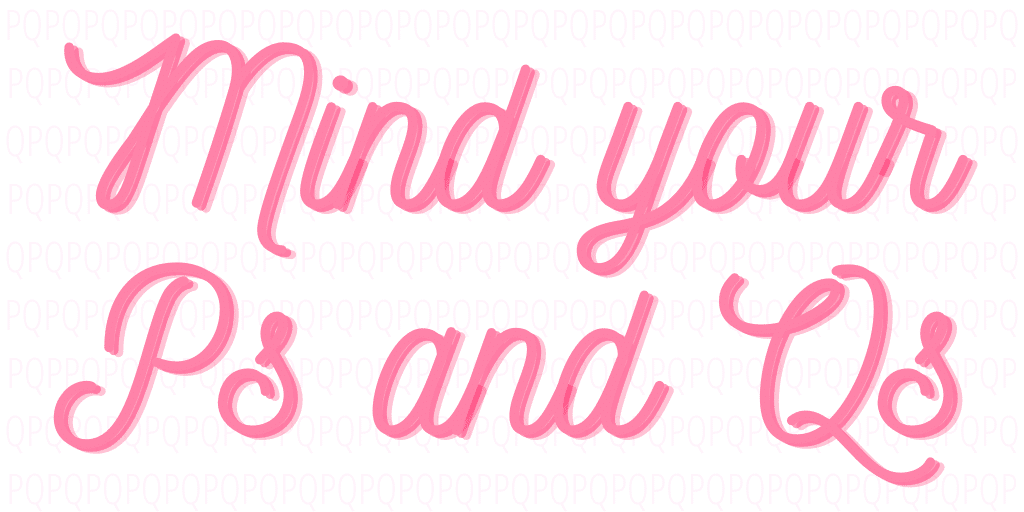Meaning of “mind your Ps and Qs”
“Mind your Ps and Qs” is phrase is a common English idiom that means “be careful about what you say or do.” It is often used as a warning to someone who is about to say or do something that could get them into trouble. It is usually used in the social sense of being careful about one’s manners, a warning to behave appropriately.
Origin of “mind your Ps and Qs”
There are several theories regarding the origin of the phrase. One theory is that it comes from the practice of chalking up a tally of drinks in English pubs. In the days before cash registers, publicans would keep track of how much each customer owed by chalking up a tally on a slate. The letters “P” and “Q” were used to represent pints and quarts, respectively. So, if a customer was getting rowdy, the publican might shout at them to “mind their Ps and Qs,” meaning to be careful not to drink too much and get into trouble.
Another theory is that the phrase comes from the practice of typesetting in printing. In the days before computers, typesetters had to manually set each letter in a piece of type. The letters “P” and “Q” are very similar in appearance, and it was easy for typesetters to accidentally mix them up. So, a typesetter might be told to “mind their Ps and Qs” to make sure they were setting the letters correctly.
A third theory is that the phrase comes from the French language. In French, the words for “feet” and “wigs” are “pieds” and “perruque.” It is possible that the phrase “mind your p’s and q’s” originated as an instruction to dancers to be careful not to trip over their feet or knock off their wigs.
It is also possible that the phrase has no single origin, but rather evolved from a combination of different sources. Whatever its origin, the phrase “mind your Ps and Qs” is a reminder to be careful and to watch what you say or do.
In addition to the three theories mentioned above, there are a few other possible origins for the phrase “mind your Ps and Qs.” One theory is that it comes from the practice of teaching children to write. The letters “P” and “Q” are two of the most difficult letters for children to learn to write, so teachers might have told them to “mind their Ps and Qs.”
Another theory is that the phrase comes from the military. In the days before radios, soldiers would use flags to communicate with each other. The letters “P” and “Q” were used to represent different flags, so soldiers might have been told to “mind their Ps and Qs” to make sure they were using the correct flags to communicate.
Ultimately, the origin of the phrase “mind your Ps and Qs” is unknown. However, the phrase is a reminder to be careful and to watch what you say or do. It is a phrase that has been used for centuries, and it is likely to continue to be used for many years to come.
Minding your Ps and Qs in literature
The earliest record we have of someone’s Ps and Q s appears in the 1601 Jacobean play called Satiromastix, or The Untrussing of the Humorous Poet by Thomas Dekker:
“Now thou art in thy Pee and Kue, thou hast such a villanous broad backe.”
That suggests that the Ps and Qs might have been items of clothing—namely, a sailor’s pea-coat or pea-jacket (a kind of overcoat) and a queue or queue-peruke (a long plait of hair , an accessory worn by high-ranking naval officers). But how that leads to a warning about manners is not immediately apparent.

Minding your Ps and Qs?
Using “mind your Ps and Qs” in everyday language
- You had better mind your Ps and Qs when you’re talking to your elders.
- The teacher told the students to mind their Ps and Qs on the field trip.
- The boss told his employees to mind their Ps and Qs if they wanted to keep their jobs.
- The coach told the players to mind their Ps and Qs if they wanted to win the game.
- The police officer told the crowd to mind their Ps and Qs or they would be arrested.
- The doctor told the patient to mind their Ps and Qs after surgery.
- The parent told the child to mind their Ps and Qs or they would be grounded.
- The judge told the defendant to mind their Ps and Qs or they would be charged with contempt of court.




I had heard it as an admonishment to remember to say “please” and “thank you,” which seems to at least somewhat comport with common usage.